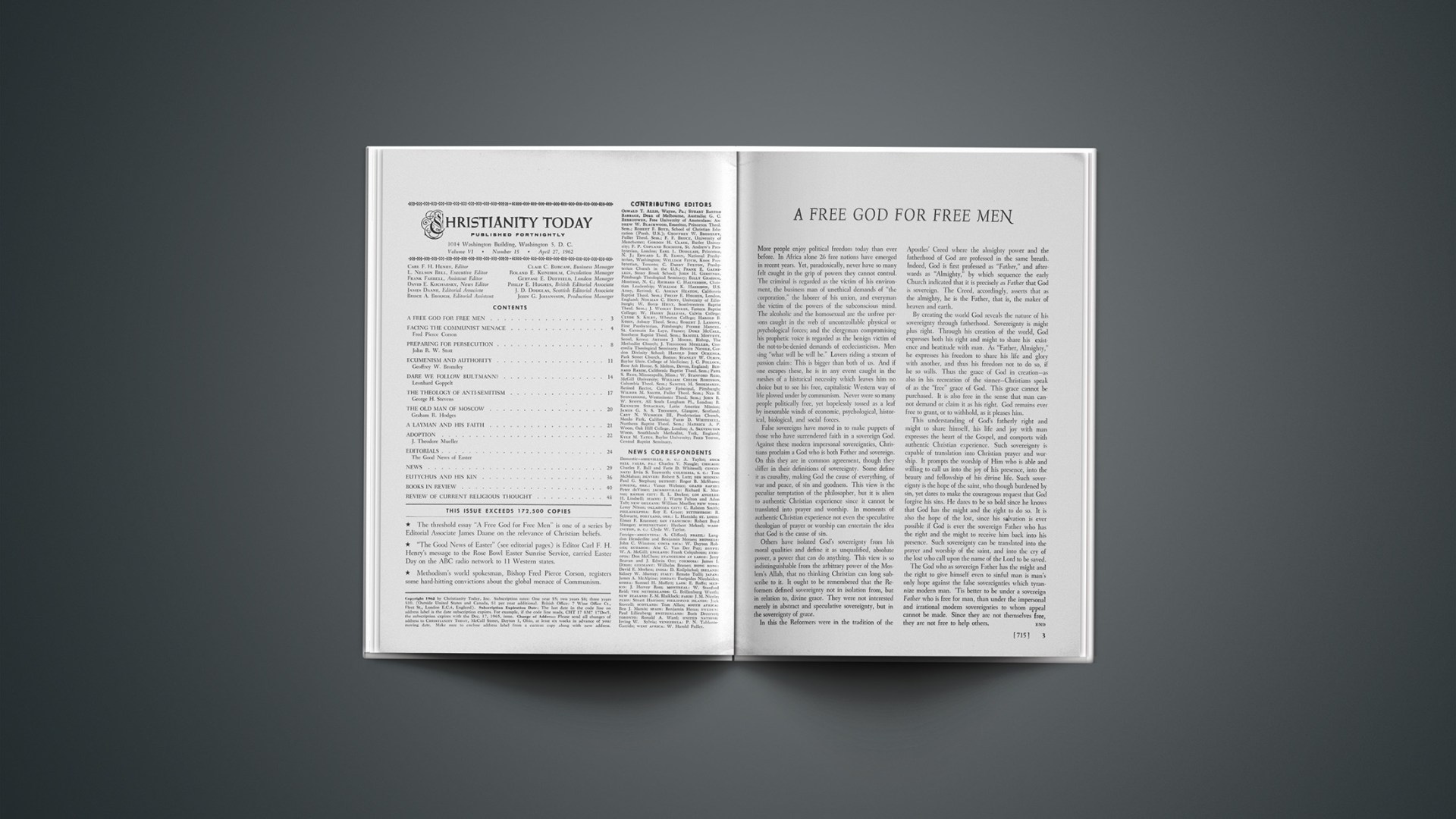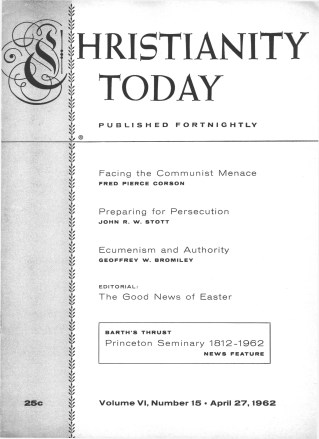More people enjoy political freedom today than ever before. In Africa alone 26 free nations have emerged in recent years. Yet, paradoxically, never have so many felt caught in the grip of powers they cannot control. The criminal is regarded as the victim of his environment, the business man of unethical demands of “the corporation,” the laborer of his union, and everyman the victim of the powers of the subconscious mind. The alcoholic and the homosexual are the unfree persons caught in the web of uncontrollable physical or psychological forces; and the clergyman compromising his prophetic voice is regarded as the benign victim of the not-to-be-denied demands of eccleciasticism. Men sing “what will be will be.” Lovers riding a stream of passion claim: This is bigger than both of us. And if one escapes these, he is in any event caught in the meshes of a historical necessity which leaves him no choice but to see his free, capitalistic Western way of life plowed under by communism. Never were so many people politically free, yet hopelessly tossed as a leaf by inexorable winds of economic, psychological, historical, biological, and social forces.
False sovereigns have moved in to make puppets of those who have surrendered faith in a sovereign God. Against these modern impersonal sovereignties, Christians proclaim a God who is both Father and sovereign. On this they are in common agreement, though they differ in their definitions of sovereignty. Some define it as causality, making God the cause of everything, of war and peace, of sin and goodness. This view is the peculiar temptation of the philosopher, but it is alien to authentic Christian experience since it cannot be translated into prayer and worship. In moments of authentic Christian experience not even the speculative theologian of prayer or worship can entertain the idea that God is the cause of sin.
Others have isolated God’s sovereignty from his moral qualities and define it as unqualified, absolute power, a power that can do anything. This view is so indistinguishable from the arbitrary power of the Moslem’s Allah, that no thinking Christian can long subscribe to it. It ought to be remembered that the Reformers defined sovereignty not in isolation from, but in relation to, divine grace. They were not interested merely in abstract and speculative sovereignty, but in the sovereignty of grace.
In this the Reformers were in the tradition of the Apostles’ Creed where the almighty power and the fatherhood of God are professed in the same breath. Indeed, God is first professed as “Father,” and afterwards as “Almighty,” by which sequence the early Church indicated that it is precisely as Father that God is sovereign. The Creed, accordingly, asserts that as the almighty, he is the Father, that is, the maker of heaven and earth.
By creating the world God reveals the nature of his sovereignty through fatherhood. Sovereignty is might plus right. Through his creation of the world, God expresses both his right and might to share his existence and beatitude with man. As “Father, Almighty,” he expresses his freedom to share his life and glory with another, and thus his freedom not to do so, if he so wills. Thus the grace of God in creation—as also in his recreation of the sinner—Christians speak of as the “free” grace of God. This grace cannot be purchased. It is also free in the sense that man cannot demand or claim it as his right. God remains ever free to grant, or to withhold, as it pleases him.
This understanding of God’s fatherly right and might to share himself, his life and joy with man expresses the heart of the Gospel, and comports with authentic Christian experience. Such sovereignty is capable of translation into Christian prayer and worship. It prompts the worship of Him who is able and willing to call us into the joy of his presence, into the beauty and fellowship of his divine life. Such sovereignty is the hope of the saint, who though burdened by sin, yet dares to make the courageous request that God forgive his sins. He dares to be so bold since he knows that God has the might and the right to do so. It is also the hope of the lost, since his salvation is ever possible if God is ever the sovereign Father who has the right and the might to receive him back into his presence. Such sovereignty can be translated into the prayer and worship of the saint, and into the cry of the lost who call upon the name of the Lord to be saved.
The God who as sovereign Father has the might and the right to give himself even to sinful man is man’s only hope against the false sovereignties which tyrannize modern man. ’Tis better to be under a sovereign Father who is free for man, than under the impersonal and irrational modern sovereignties to whom appeal cannot be made. Since they are not themselves free, they are not free to help others.










